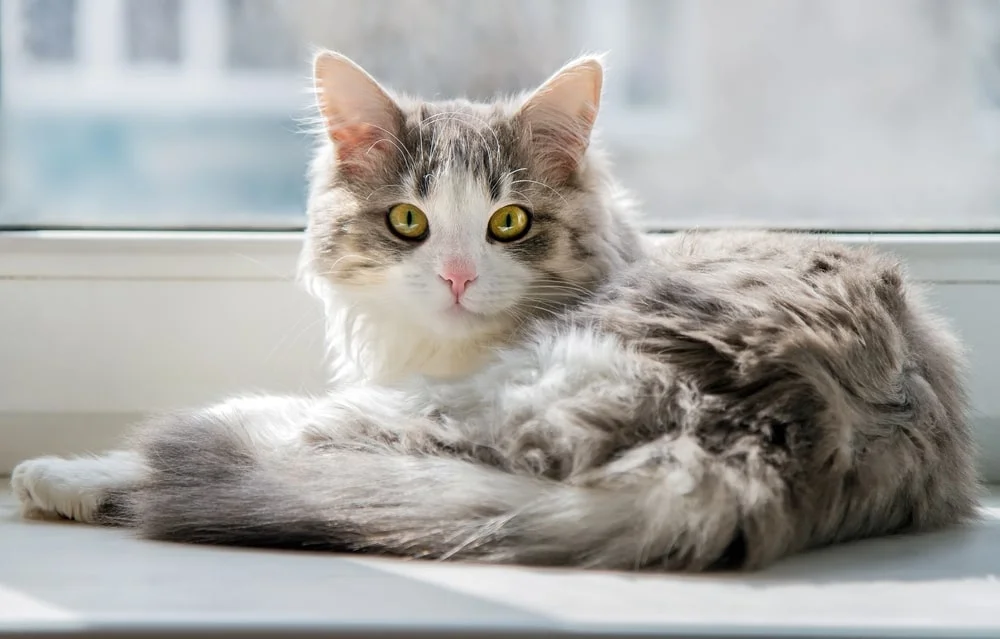As a cat owner, it’s important to know the signs of a seizure in your furry friend — especially since up to 2% of all cats are impacted by seizures.1 So what should you be on the lookout for? Let’s break down what cat seizures are, symptoms, causes, treatment options, and how pet insurance may be able to help offset costs at the vet.
Cat Seizures: What Are They?
Cat seizures are sudden bursts of electrical activity in a cat’s brain that cause uncontrollable muscle movement.2 They can last anywhere from a few seconds to several minutes. When they occur repeatedly, they may be labeled as epilepsy.2
Types of seizures in cats
There are three common kinds of seizures that occur in cats. Let’s take a look at the types of seizures your cat may be suffering from:2
- Generalized seizures: Generalized seizures, sometimes called grand mal seizures, last about 1 – 2 minutes. They’re recognizable by extreme shaking or jerking, locked limbs, and urination or defecation. If your cat’s seizure lasts longer than 5 – 10 minutes, the seizure is status epilepticus. This means your cat needs immediate veterinary care.
- Partial seizures: Partial seizures, sometimes called focal seizures, affect only certain muscles and may cause irregular behavior. You might notice your cat nipping at the air, chasing their tail, or acting more aggressively than normal.
- Absence seizures: Absence seizures are minor seizures that can go unnoticed in cats. Instead, your cat may appear absent-minded or confused in their surroundings.
Cat seizure phases
There are three phases your cat goes through during a generalized seizure. Let’s break down exactly what happens:2,3
- Preictal phase: The preictal phase, sometimes called an aura, is when your cat will change their behavior as a warning sign. During this phase, your cat may act a little more nervous or clingy than normal.
- Ictus phase: The ictus phase is when the seizure is happening.
- Postictal phase: The postictal phase is your cat's recovery period after a seizure. You may notice more behavioral changes, like drowsiness, pacing, fluctuation in mood, and excessive drinking or eating. This phase may last around 1 – 2 days.
A MetLife Pet Policy May Help Cover Seizure Costs
Cat Seizure Symptoms: What To Look For
If your cat is suffering from a seizure or epilepsy, you may notice a wide array of symptoms. Here are some cat seizure signs and symptoms to be on the lookout for:4,5
- Drooling
- Disorientation
- Loss of consciousness
- Severe shaking of limbs
- Vocalization
- Urination or defecation
- Abnormalities in behavior
- Sudden collapse
Why Do Cats Have Seizures?
Your cat’s seizures could be due to a number of factors. In other words, seizures aren’t always caused by epilepsy. From old age to human error or certain cat diseases, let’s talk about what can trigger a seizure in a cat:
- Accidents: We know you may not want to hear it, but accidents happen. Human error, such as giving a cat a toxin by accident, can be the cause of seizures in cats. Some topical or ingested poisons you may want to avoid giving your feline friend include ibuprofen, certain antibiotics, and flea prevention products meant for dogs — such as permethrin.6
- Aging: According to the Journal of Veterinary Internal Medicine, aging greatly increases the risk of cats developing recurrent seizure disorders.7
- Brain diseases or injuries: When a seizure is caused by a problem in the brain, it’s called an intracranial seizure. Common causes are brain tumors, infections, stroke, head trauma, brain damage, or diseases like epilepsy.2
- Metabolic diseases: Seizures caused by medical problems outside of the brain are extracranial seizures.8 Certain metabolic cat diseases, like kidney disease or liver disease, can be to blame.
It’s important to note that factors like your cat’s breed, sex, weight, and whether they’ve been neutered don’t contribute to their chance of having a seizure.
How to help your vet determine cat seizure causes
Discussing your kitty’s medical history with your vet may help get to the bottom of what’s causing their seizures. We’ve put together a list of questions you may want to ask yourself to prepare for this conversation:3
- How old is your cat?
- Does your cat have a history of seizures? If yes, have you noticed that they occur around the same time of day or during the same activities?
- Has your cat recently had any head trauma?
- Does your cat have a history of medical issues, like brain tumors, kidney disease, liver disease, or stroke?
- Have you recently changed your cat’s diet or given them any medication that you wouldn’t normally? Or has your cat come in contact with any toxic substances?
- Have you noticed any changes in their behavior or personality?
How To Treat Cat Seizures
Generally, the goal of treatment is to reduce the rate and severity of seizures. If left untreated, recurring seizures could lead to further brain damage.8
The treatment your cat receives will depend on the underlying cause of the seizures. Once your vet has narrowed down the cause through blood tests, X-rays, and more testing avenues, they may treat the cause itself. If no cause is found, your vet may prescribe an anticonvulsant medication.3 In some cases, especially those of status epilepticus, some cats may need quick-acting medications, like diazepam. Additionally, your vet may keep your kitty under hospitalized care for further monitoring.8,9
How Can Pet Insurance Help Treat Cat Seizures?
Depending on the severity and rate at which your cat’s seizures occur, treatment could cost around $500 – $1,500 — and that’s only to get a diagnosis and exam.9 For example, in our blog breaking down cat X-rays, we estimate that X-rays could cost about $250. In emergency situations, X-rays may cost even more. Further examination, medication, and potential surgeries could cost more than $3,000.9
For many of us, the cost of vet bills adds stress on top of our cat being sick. Luckily, a cat insurance plan may be able to help you cover the costs of treating your cat’s seizures. Unfortunately, most pets get sick at some point in their life. Read our blog to find out why pet insurance may be worth it, and then get a quote from MetLife Pet Insurance to support your cat’s health.
We can help handle the vet bill
while you focus on your cat's care.
855-270-7387



